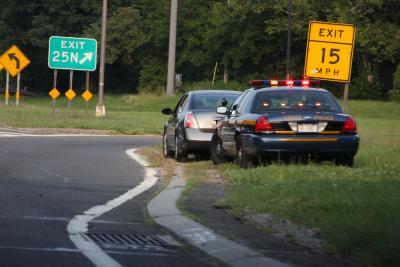New York State has some of the toughest anti-drinking and driving laws in the country; DWI (Driving While Intoxicated) is a crime that carries stiff consequences, even on the first violation. Penalties for DWI in New York include fines and surcharges, license suspension and jail time ranging from 15 days to 7 years.
Following the passing of "Leandra's Law" in 2010, every driver who is convicted of drunk driving charges (including first-time offenders) must pay to install and maintain an ignition interlock device on their vehicle for a minimum of 6 months; this is in addition to any other penalties resulting from a DWI conviction.
Traffic Stops and DWI Testing

If you are pulled over by a police officer who suspects you may be driving under the influence of either alcohol, drugs or both, the officer will conduct a quick assessment of your sobriety by asking a few simple questions, looking for signs of impairment (such as slurred speech, glassy eyes and the smell of alcohol on your breath). Your could be asked to provide the officer with your insurance and vehicle ownership papers as well as your license. If the officer suspects that you have been drinking or are under the influence of drugs, you will be asked to step out of the vehicle. You may then be asked to undergo "field sobriety tests"; refusing to cooperate with roadside testing for intoxication can be deemed as probable grounds for your immediate arrest.
Types of Field Sobriety Tests
In New York State, DWI field sobriety tests include both a breathalyzer test to assess your Blood Alcohol Concentration, known as your BAC. This involves blowing into a hand-held electronic device that measures how much alcohol is in your blood; in NY, a BAC of 0.08 or higher is grounds for a DWI charge, while a DWI of 0.18 or greater can lead to a charge of Aggravated DWI. Refusal to take a BAC test can result in a one-year driving ban as well as a $500 fine.
In addition to the BAC test, field sobriety tests include physical tests designed to assess a driver's hand-eye coordination, ability to follow directions and their visual acuity. In NY, the most common roadside tests include:
The Balance Test - This test requires the driver to balance on one leg, unassisted, for at least 30 seconds - it assesses common signs of intoxication such as loss of focus, balance and coordination.
The Line Walk - Drivers are asked to walk heel-to-toe along a straight line for nine steps then turn and walk back on command - this checks for response time and the ability to follow directions.
The Gaze Test - The driver must remain completely still while following an object (such as a pen) with their eyes only - people who are intoxicated tend to have limited peripheral vision, making it difficult for them to complete this test without moving their head.
If you fail any of the field sobriety tests, you may be placed under arrest and taken to the local police station for processing, Your car will likely be towed away (at your expense) and depending on your level of intoxication, you may be held overnight in the local "drunk tank" until you are sober.
For More Information
To learn more about DWI laws in New York state, read the NYS DMV's Guide entitled "You And The Drinking Driving Laws" or consult with a NY attorney who specializes in DWI cases.




